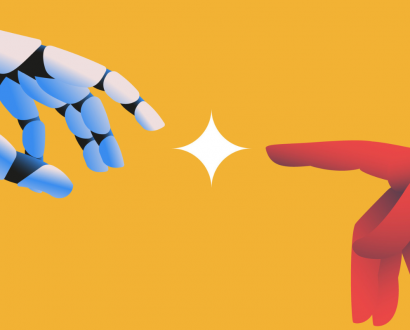Beginning on Leonardo da Vinci’s birthday – 15 April – and running until World Creativity and Innovation Day on 21 April 2018, World Creativity and Innovation Week is all about embracing change and creating new ideas.
C2 Melbourne’s CEO of Asia–Pacific Martin Enault shares his insights on what the event means for business and why creativity is crucial for success, no matter what industry you’re in.
Martin, do you believe that everyone is creative?
Yes. Everyone is unique in their thinking and their way of looking at the world but unfortunately we don’t look at creativity in a way that’s inclusive. We assign it only to the world of art, culture, drawing, painting and music.
Creativity is something that can be used as a mindset for anything you do. I have yet to meet anyone who said their baby wasn’t playful and creative. That’s how kids learn – by being creative and experimental.
I myself started my career in technology. I cannot draw, I cannot sing, I cannot dance, I cannot do anything that is considered part of the “creative world”, and yet people keep referring to me as being creative, so why is that?
It’s because I use creative thinking as a way to see the world, a way to look at a problem from different angles and a way to put myself in other people’s shoes.
Why is creativity important?
Creativity is important because we live in a world that is very disrupted right now by technology.
Also, millennials, and every generation after them, are looking at the world differently. They expect companies, government and institutions to give them services based on their own preferences instead of a cookie-cutter version offered to everyone.
If you want to be successful in business these days you need to use creative thinking in order to come up with new ideas to reflect the needs of consumers.

Do we need to cater to customers in a way that’s more satisfying for individuals?
Well, it needs to be centred on what customers want. It’s not about figuring out every different option, it’s about giving them the tools to do what they want to do with your services and giving the power back to them.
So, in order to do that you need to put yourself in their shoes and come up with creative and innovative ideas using technology.
If you want to be successful in business these days you need to use creative thinking.
Why do business leaders need to be creative and innovative?
Because if CEOs believe that creative thinking is only important for one little part of the company, then they’re actually telling the entire company that creative thinking is not paramount to the success of their business.
Personally, I have yet to see a disrupted business that can succeed without adapting with some kind of creative thinking in reshaping their services and staying relevant.
We are in the early stage of disruption; there will be more constant disruption every week, every day, there will always be something we didn’t see coming.
Business leaders need creative thinking to find solutions to problems and find ideas for services that consumers will love to use, even before the consumers tell them that that’s what they want.
What can people do every day to strengthen their creativity and innovation muscles?
Put yourself in the shoes of the consumer, put yourself in an environment that will help you feel creative, whether online or offline. Ask yourself, ‘What are the things (as a consumer) you wish were there?’
Give yourself the time and space to look at the situation from a different perspective, from the eyes of different types of consumers. By doing that, you train your brain to start looking at problems from different angles.
Sometimes you need to make a decision that makes you feel slightly uncomfortable, that you would not normally make. Take a gamble on something when you have no reason to say no, other than fear itself, and see where that leads you.
Take a gamble on something when you have no reason to say no, other than fear itself, and see where that leads you.
The UN claims that a change in perspective can give people hope. Do you think being creative can also help improve mental health?
Definitely. If you’re just doing the same thing over and over again, and you feel like a hamster in a wheel – that can be depressing.
When you give people the power to review their life from a different perspective and do work that inspires and engages them, and uses different parts of their brain, it is empowering and does help people’s mental state.
Would you say that creativity is who we are, as humans? Is it what makes us different from animals?
It’s what makes us different from animals but also what makes us different from robots, and if there is one thing that robots do not have at this stage, it is creative thinking.
To ensure your job in the future, it doesn’t mean you need to learn to code or build a robot. But it does mean you need to understand the days of doing the same work for 20–25 years and then retiring are gone, and creative thinking is paramount to being successful.
In what way does creativity and innovation improve a business’s bottom line?
By creating new service lines and offerings, you’ll improve your productivity because your employees will be more engaged; they’ll be positive about the future and emotionally connected to what you’re creating instead of just repeating the same old work over and over again.
So, creative thinking will make you a better boss. Can it also help you be a better teacher, a better parent, and a better citizen?
Yes, and a better government and a better church and a better everything, for sure.
Why do you think the UN has chosen to shine a spotlight on this right now?
It should have started many years ago, but humans are happy to live in a world that doesn’t change all that much and follow the same routine.
When you take every innovation and every change that has happened to society over the past 2,000 years, all of them came from true creative thinking. When someone claimed that the Earth was not flat, but round – that was a very bold idea that required creative thinking.
So, it’s not a new thing. What is new is that you used to have one person in your company adopting it, but technology means everyone needs to use creative thinking to be successful.
How will creativity and innovation help solve some of the world’s very weighty problems like environmental degradation, gender inequality and poverty, which are part of the UN’s social goals?
Things like poverty make no sense in a globalised world because you want more consumers to be able to buy your product and you want more people to be able to contribute.
There’s no reason why part of the world should be living in poverty these days. Creativity integrates everyone into the discussion, to come up with the best ideas. Once a business does social good, and the community knows this, they will also be more connected to your brand and will want you to succeed versus just being passive consumers.
It’s the same with the way we educate our kids. In the future, companies will have difficulty finding the right people to work for them because schools aren’t training people the right way. We keep forcing students to think like factory workers, in the way that we treat them. So, it is good for business to tackle those issues.
What’s the message for Australian business leaders?
Australia has been blessed with not having a recession for 25 years. If companies don’t understand that the world has changed, and is changing faster and will continue to change, then whatever they are selling or doing will fail in the next decade.
If companies are serious about building a future for themselves and for their kids, they need to adopt creativity and innovation.
If companies are serious about building a future for themselves and for their kids, they need to adopt creativity and innovation.
Generally, Australian companies are not investing much in ideas, diversity or R&D, which are crucial in a disrupted world that is focused on all clients, not just white men.
Talking to people from different industries, different backgrounds, different ethnicities, different genders will always generate better, more creative, and more successful ideas.







